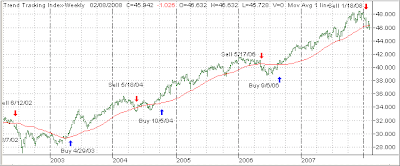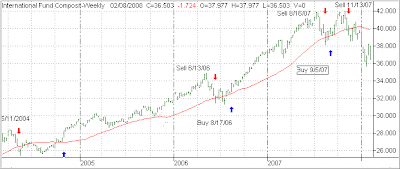With the unwinding of the credit bubble, new terminology has been thrown at the public at an amazing pace. One of the terms you hear more frequently as banks are writing down bad investments, is “counter party risk.”
Rob Roy’s article “Default Swaps Intensify Credit Crunch,” explores some of the details how leverage combined with abnormal events can have devastating effects on CDOs, SIVs and MTNs). Here are some highlights:
Abnormal events are magnified with financial leverage, and even normal events can become catastrophic with large amounts of leverage. This is clearly seen with the sub-prime and other low quality loans that were packaged into Collateralized Debt Obligations (CDOs) and then sold off to institutional investors thirsty for higher returns. Other financial “alchemy”, courtesy of Wall Street’s greatest quantitative minds included upwards of $300 billion of Structured Investment Vehicles (SIVs). The SIVs took in a lot of mortgage paper (both commercial and residential), added some leverage to the recipe, and then issued a package of commercial paper/equity/junior notes/senior medium term notes (MTNs). These investments (We use this word loosely and prefer ‘derivatives’) were ‘stress tested’ for normal delinquency rates. Of course now they realize that these are not normal times.
My firm believes it is dangerous to use history as a guide in today’s complicated environment. Instead, we believe that we are now making financial history and when we look back twenty years from now, we will see today as the unwinding of the ‘Great Debt Experiment’. Which leads me to what we believe what is the greatest risk of all: Counterparty Risk. Counterparty risk, simply defined, is the risk that the other party in an agreement will default.
…
…Oh yes, the brokerage industry. If you think the banks are a mess, try taking a quick look at the balance sheets of companies like Lehman (LEH) and Bear Stearns (BSC). These companies have balance sheets that are literally 40 times their shareholder equity. They also own 3 times their equity in what is known as ‘Level 3 assets’—those that can’t be accurately priced, and can’t even be estimated based on a model. Level 3 is ‘mark to management’s best guess’. Best guess is better than what Citi’s CFO said when asked about its $60 billion of CDOs. On the investor conference call he stated that their positions were ‘marked to a reasonable stab’. I know this may sound as if I am making this up, but sadly, I am not. In Citi’s case, this was before they brought approximately $45 billion of SIVs back onto their balance sheet in late 2007. This explains why the banks, brokers, and insurance companies are constantly coming to market to raise fresh capital.
This cross-dependency on other institutions is why counter-party risk may be the next problem child to raise its ugly head and may be the greatest risk of them all. We have been hearing the murmurs of counter-party risk for the last several years. The last measure of the credit derivatives market is $45 trillion (yes with a T) which didn’t happen overnight. Like any big disaster, it didn’t reach its tipping point in an instant but rather built up over a substantial time period where warnings were not heeded.
The risk isn’t just that the other party to your derivative trade suffers a financial meltdown and can’t pay. Counter-party risk really seems to take on three types of events. In the most widely understood event, a trade in which you are winning and are owed money by the counter-party isn’t paid to you because of their inability. This first risk is pretty simple, but even so these kinds of failures may cause you enough pain to pass the problem down the line by creating an inability on your part to pay your obligations. This is a daisy chain effect.
The second kind of counter-party risk is that these private transactions which are agreed to in complicated legal documents have not been properly documented. Many credit derivative transactions don’t simply involve two parties but are often times the risk is passed from one party to the next several times. When an event occurs it causes a careful examination of the complicated legal documents which spell out the specifics of solving a default event.
Case in point is today’s news that AIG’s stock tumbled on heightened CDO concerns:
PricewaterhouseCoopers LLC said AIG had a material weakness in its internal control over financial reporting and oversight related to the valuation of a derivatives portfolio owned by AIG Financial Products Corp., a unit of AIG, the company said in a regulatory filing.
…
AIG’s Financial Products unit sold similar guarantees on CDOs, using credit-default swaps (CDS), which are a type of derivative-based insurance that pays out in the event of a default. It sold “super senior” CDS that guaranteed higher quality parts of CDOs.
But as the credit crunch widened, the market value of even the best parts of some CDOs have declined. The complexity of these securities and a slump in trading activity has made them tricky to value, adding to concerns.
…
AIG could end up paying out as much as $10 billion from the CDS it has sold on CDOs, which is about 10% of the insurer’s net worth and roughly three quarters of earnings, Matt Nellans, an equity analyst at Morningstar, wrote in a note to clients on Monday.
Still, market-based valuation changes within this portfolio don’t necessarily mean AIG will end up paying the same amount to settle its obligations, the analyst added. Ultimate losses depend on the number and severity of defaults on the assets that back the CDOs the insurer has guaranteed, he explained.
AIG’s exposure to riskier securities known as mezzanine CDOs are more worrying, Nellans said, noting that the company had roughly $19 billion of such exposure at the end of September.
AIG again guaranteed the highest-rated parts of these securities, but they are backed by riskier underlying assets, he explained.
“In the event the underlying securities fail a cash-flow test or are downgraded, the remaining cash flows will be diverted from the lower-rated AIG insured tranches to the higher-rated tranches,” Nellans wrote.
“AIG could withstand a total loss on this $19 billion of exposure, but it would wipe out 19% of the firm’s equity and about 15 months of earnings,” he added.
Again, any guarantee is only as good as the entity backing it up and, in the case of CDOs, provided there is even a market into which to sell. As many banks and brokerage houses have found out, buyers are hard to find and discounts are steep. Short of a drastic change, this means that more write-downs are coming, which will contribute to a continuation of the credit crisis until all skeletons are out of the closet.





